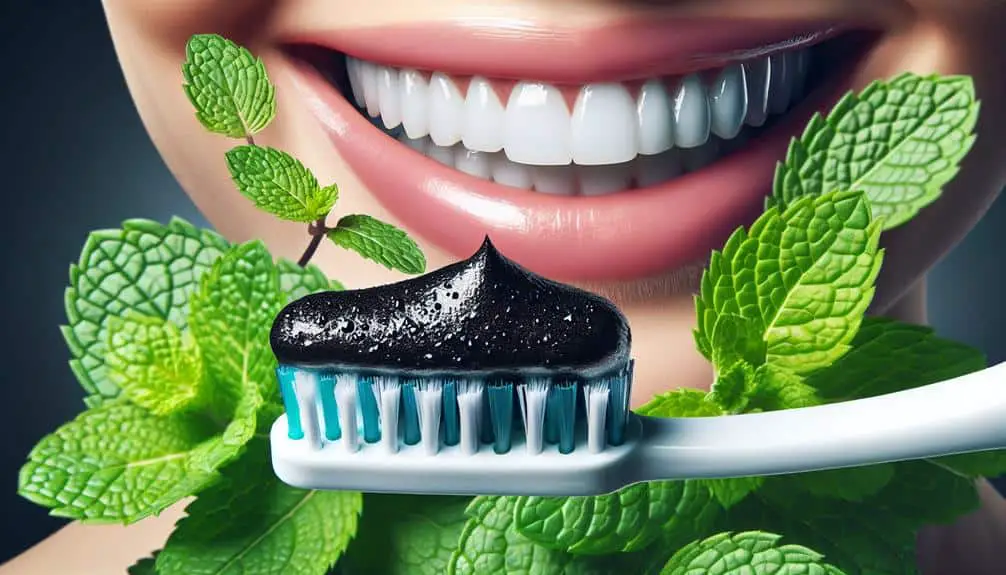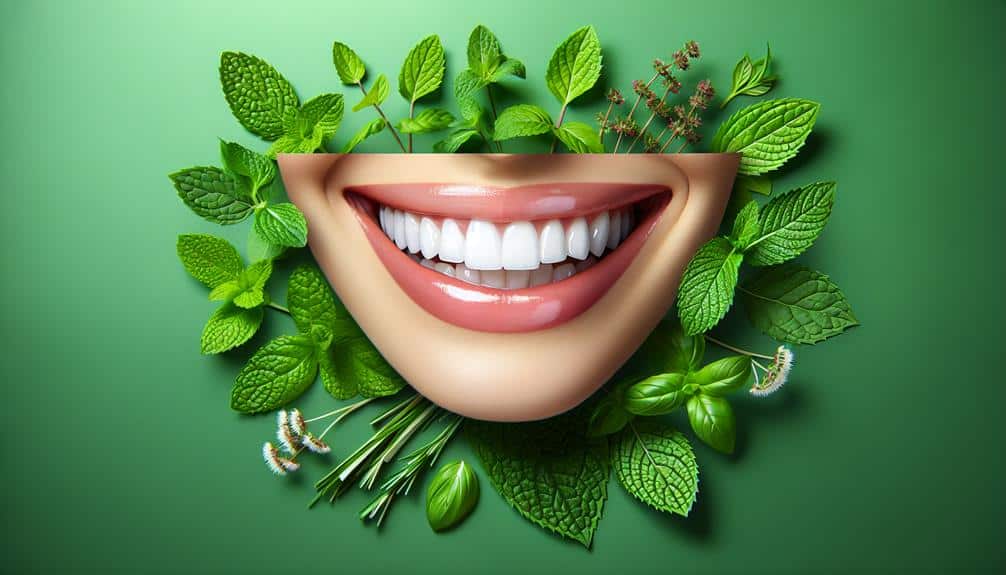Achieve a brighter smile with top activated charcoal toothpaste brands like Crest, Colgate, and Hello, known for their effective teeth whitening and oral health benefits. These brands excel in gently removing stains with natural ingredients like coconut oil and bentonite clay while also offering antibacterial properties to support your overall oral health.
Choosing a reputable charcoal toothpaste guarantees the absorption of surface stains and the attraction of plaque and debris, brightening your smile effectively. Prioritize products that are gentle on enamel and consider your tooth sensitivity when selecting a charcoal toothpaste. Explore various options to find the best match for your oral care needs.
Key Points
- Choose charcoal toothpaste with natural ingredients for holistic oral care.
- Look for reputable brands like Crest and Colgate for effective whitening.
- Consider Hello for eco-friendly packaging and natural formula.
- Prioritize enamel protection and tooth sensitivity in product selection.
- Use charcoal toothpaste 2-3 times a week with a soft brush for safety.
Benefits of Activated Charcoal Toothpaste
Activated charcoal toothpaste offers a natural and effective way to whiten teeth without harsh chemicals. With its emphasis on natural ingredients, this type of toothpaste is becoming increasingly popular among individuals seeking a more holistic approach to oral hygiene. The benefits of activated charcoal toothpaste extend beyond just teeth whitening; it can also help in promoting overall oral health.
Natural ingredients in activated charcoal toothpaste, such as coconut oil and bentonite clay, work together to gently remove surface stains from the teeth without causing damage to the enamel. This makes it a safer alternative to traditional whitening products that may contain abrasive chemicals. Moreover, the antibacterial properties of activated charcoal can aid in reducing harmful bacteria in the mouth, contributing to improved oral hygiene.
Incorporating activated charcoal toothpaste into your oral hygiene routine can provide a gentler yet effective way to maintain a bright smile while also supporting overall oral health.
How Activated Charcoal Whitens Teeth
To achieve teeth whitening, activated charcoal works by absorbing and removing surface stains through its porous nature. The effectiveness of charcoal in whitening teeth lies in its adsorption properties, which attract and bind to particles such as plaque and food debris that cause discoloration. This process helps lift these stains from the teeth, resulting in a brighter smile.
When considering charcoal toothpaste for teeth whitening, importance is a common concern. Activated charcoal is generally safe for use on teeth, but it's vital to make sure that the product is from a reputable source and approved for dental use. Additionally, some individuals may experience tooth sensitivity when using charcoal toothpaste. If sensitivity occurs, it's recommended to use the product less frequently or consult with a dentist.
Furthermore, while charcoal can be effective in removing surface stains, it's essential to prioritize enamel protection. Some charcoal toothpaste formulations may be abrasive, potentially causing enamel damage with prolonged use. To mitigate this risk, select charcoal toothpaste products that are gentle on enamel and consider alternating with a fluoride toothpaste to maintain enamel health.
Factors to Consider When Choosing Charcoal Toothpaste
When selecting a charcoal toothpaste, make sure to assess its abrasiveness and enamel protection to safeguard your dental health. Activated charcoal toothpaste can be a beneficial addition to your oral care routine, but it's crucial to ponder some key factors before making a purchase. Here are some important considerations:
- Tooth Sensitivity: Check if the charcoal toothpaste is suitable for individuals with tooth sensitivity. Some formulations may be too harsh for sensitive teeth, leading to discomfort or pain during brushing.
- Ingredient Safety: Look for charcoal toothpaste brands that prioritize safe and effective ingredients. Ensure the product doesn't contain harmful additives or excessive abrasives that can damage your enamel over time.
- Enamel Protection: Opt for a charcoal toothpaste that not only whitens but also provides enamel protection. Enamel is crucial for maintaining strong and healthy teeth, so choose a product that helps strengthen and preserve it.
Top Brands of Activated Charcoal Toothpaste
Consider exploring notable brands that offer activated charcoal toothpaste to enhance your teeth whitening experience and oral care routine. When looking at charcoal toothpaste trends and innovation, brands like Crest, Colgate, and Hello are often mentioned among the top choices. These brands have gained popularity due to their effective whitening properties and overall oral health benefits.
Consumer reviews and recommendations play a significant role in determining the best brands of activated charcoal toothpaste. Crest's charcoal toothpaste, for instance, is praised for its gentle yet powerful formula that effectively removes stains and brightens teeth. Colgate offers a range of charcoal toothpaste options, catering to different preferences such as flavor and sensitivity levels. Hello stands out for its natural ingredients and eco-friendly packaging, appealing to those looking for a more sustainable oral care option.
Tips for Using Charcoal Toothpaste Safely
For safe and effective use of charcoal toothpaste, make sure you follow these essential tips.
- Proper application:
- Use a soft-bristled toothbrush to apply the charcoal toothpaste gently to your teeth.
- Brush in small, circular motions for about two minutes to guarantee all surfaces are covered.
- Rinse your mouth thoroughly after brushing to remove any residue.
- Potential risks:
- Charcoal toothpaste may be abrasive, so avoid using it more than 2-3 times a week to prevent enamel damage.
- If you experience any unusual sensitivity or irritation, discontinue use and consult your dentist.
- Be cautious when using charcoal toothpaste if you have sensitive teeth or existing dental issues.
- General tips:
- Store your charcoal toothpaste in a cool, dry place away from moisture to maintain its effectiveness.
- Follow up with a regular fluoride toothpaste to ensure you're still getting the necessary cavity protection.
- Remember that charcoal toothpaste is meant for occasional use alongside your regular oral hygiene routine.
Frequently Asked Questions
Can Activated Charcoal Toothpaste Be Used on Sensitive Teeth?
If you have sensitive teeth, managing sensitivity is essential. Consider toothpaste alternatives formulated for sensitive teeth. Activated charcoal toothpaste may be abrasive and unsuitable for sensitive teeth. Consult your dentist for personalized recommendations.
Is Activated Charcoal Toothpaste Safe to Use for Children?
Activated charcoal toothpaste can be risky for children's dental health. Pediatric dentistry experts warn against using activated charcoal products due to potential enamel damage and ingestion risks. It's important to prioritize safe oral care practices for children.
How Often Should Activated Charcoal Toothpaste Be Used for Best Results?
For ideal results, enhance your oral health routine by using activated charcoal toothpaste every other day. This frequency balances effective stain removal with ingredient safety. Enjoy the benefits of a brighter smile with this mindful brushing regimen.
Can Activated Charcoal Toothpaste Cause Any Side Effects or Reactions?
Using activated charcoal toothpaste may have potential risks. It's important to take precautions. Allergic reactions or sensitivity could occur. Be mindful of these possibilities when incorporating this product into your dental care routine.
Are There Any Long-Term Effects of Using Activated Charcoal Toothpaste for Teeth Whitening?
In the domain of dental care, ponder the aftermath of prolonged activated charcoal toothpaste usage. Potential risks lurk, hinting at enamel wear and gum irritation. Seek alternative methods for teeth whitening, ensuring your oral health endures.




